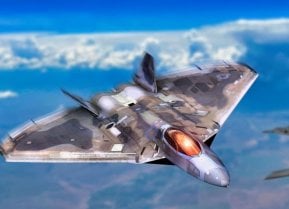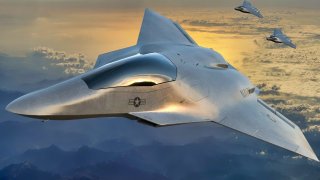Light Fighter: The Air Force Might Have a Replacement For NGAD
U.S. Air Force Gen. David Allvin recently suggested a potential shift away from the Next Generation Air Dominance (NGAD) program, hinting at the development of a "Light Fighter" concept.
Summary and What You Need to Know: U.S. Air Force Gen. David Allvin recently suggested a potential shift away from the Next Generation Air Dominance (NGAD) program, hinting at the development of a "Light Fighter" concept.
-This new approach emphasizes adaptability over durability, with a focus on modular design, open systems architecture, and digital engineering.
-The move reflects concerns that multi-billion-dollar platforms like the NGAD could become obsolete quickly. Industry experts expressed surprise at this possible shift, as the NGAD was intended to replace the F-22.
-The Air Force's reconsideration may stem from lessons learned from the costly and time-consuming F-22 and F-35 programs.
Light Fighter Coming Soon to Replace NGAD?
Comments from U.S. Air Force Gen. David Allvin suggest the Air Force is considering alternatives to Next Generation Air Dominance (NGAD), the service’s next air superiority platform.
During the Global Air and Space Chiefs Conference in London, Allvin hinted the Air Force is considering a “light fighter” that is adaptable, modifiable, and upgradeable.
Allvin is not alone in suggesting a move away from NGAD. Other industry executives at the conference in July alluded to a possible shift.
“The conference’s proceedings later published by the RAeS (Royal Aeronautical Society) put this notional design against the background of the decision by the U.S.A.F. to ‘back away from the NGAD’ and ‘evaluate’ its future ‘options,’” The Aviationist reported. “The RAeS quoted unnamed defense industry executives and other attendees who observed a marked shift in the service’s attitude towards the project, which had hit rough weather owing to a host of technical and financial reasons.”
What is a Light Fighter?
Allvin discussed what he termed a “notional Light Fighter concept,” which would mark a conceptual shift in aircraft development away from the “built to last” philosophy to a “built to adapt” philosophy.
On paper such a shift makes sense. Technology is improving at exponential rates. Modularity is becoming an expectation, allowing airframes to upgrade incrementally with new software and new avionics as technology becomes available. Making rigid technological commitments to a multi-billion-dollar platform that could become outdated in years rather than decades seems foolhardy. An emphasis on adaptability would ensure any new airframe could stick around for a little while.

Allvin said deciding to build systems to last “can become an albatross…still functioning but it’s not as effective…The United States Air Force has a large majority of its systems designed and developed with this value proposition.” The Light Fighter would be built on adaptability, not ruggedness.
Allvin envisioned a jet that would rely on open systems architecture, modular design, digital engineering, and 3d-printing/additive manufacturing – techniques and concepts to improve an airframe repeatedly over time.
What Happens Now?
Still, that the Air Force might back away from the highly touted NGAD program is catching the aerospace community off-guard. Excerpts from the RAeS proceedings referred to the NGAD pause as a “shock decision” while reporting that one senior defense industry executive said that they were “baffled by the decision.”
The NGAD was supposed to replace the F-22. Maybe lessons learned from the F-22 and the F-35 are influencing thinking about the NGAD. The Air Force’s two fifth-generation fighters were both over budget and time-intensive.
The F-22 is still the world’s premier air superiority fighter, but its stealth technology is outdated. The Air Force understandably would prefer their next fighter to stay relevant for as long as possible.
About the Author: Harrison Kass
Harrison Kass is a defense and national security writer with over 1,000 total pieces on issues involving global affairs. An attorney, pilot, guitarist, and minor pro hockey player, Harrison joined the US Air Force as a Pilot Trainee but was medically discharged. Harrison holds a BA from Lake Forest College, a JD from the University of Oregon, and an MA from New York University. Harrison listens to Dokken.
Image Credit: Creative Commons.


